 Petzlover
Petzlover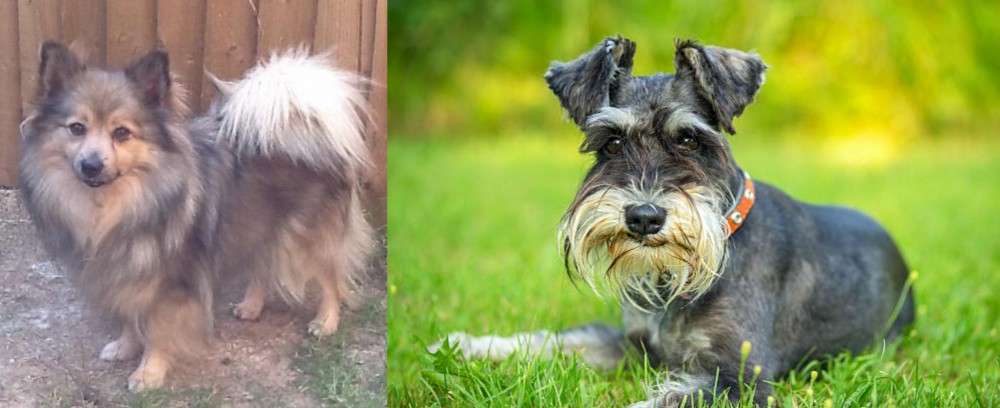 Both German Spitz (Mittel) and Schnauzer are originated from Germany. German Spitz (Mittel) may grow 13 cm / 5 inches shorter than Schnauzer. German Spitz (Mittel) may weigh 9 kg / 19 pounds lesser than Schnauzer. Both German Spitz (Mittel) and Schnauzer has almost same life span. German Spitz (Mittel) may have less litter size than Schnauzer. Both German Spitz (Mittel) and Schnauzer requires Moderate Maintenance.
Both German Spitz (Mittel) and Schnauzer are originated from Germany. German Spitz (Mittel) may grow 13 cm / 5 inches shorter than Schnauzer. German Spitz (Mittel) may weigh 9 kg / 19 pounds lesser than Schnauzer. Both German Spitz (Mittel) and Schnauzer has almost same life span. German Spitz (Mittel) may have less litter size than Schnauzer. Both German Spitz (Mittel) and Schnauzer requires Moderate Maintenance.
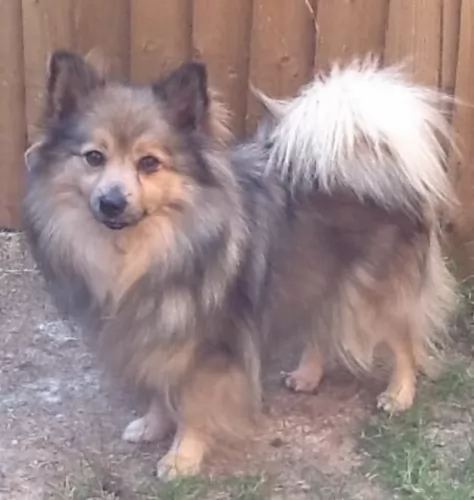 Originating in Germany, the German Spitz Mittel is an alert, vigilant dog and it is these qualities that made him sought after for working on farms.
Originating in Germany, the German Spitz Mittel is an alert, vigilant dog and it is these qualities that made him sought after for working on farms.
He is no new breed and is the 3rd largest of the five German Spitz varieties. It is believed that the German Spitz descended from the Northern sled and herding dogs which arrived with the Vikings into Europe. When you do research you see that the dogs are mentioned in German literature which dates way back to to 1450 already.
 These dogs hail from Germany and are particularly well known for their stern faces and their facial hair - the mustache and eyebrows. You get 3 types of Schnauzer – the Miniature, Standard and Giant.
These dogs hail from Germany and are particularly well known for their stern faces and their facial hair - the mustache and eyebrows. You get 3 types of Schnauzer – the Miniature, Standard and Giant.
These dogs have always been used for their rat catching skills. The Standard Schnauzer is also known as Mittelschnauzer and they have been categorized as working dogs but also as Terriers.
They've always been good herders of livestock and have been regarded as a good all-round farm dog. Most Standard Schnauzers have earned American Kennel Club (AKC) herding titles. They also make excellent watchdogs.
A breed standard for this dog was written in 1880. Also, the Bavarian Schnauzer Klub was formed in Munich in 1907.
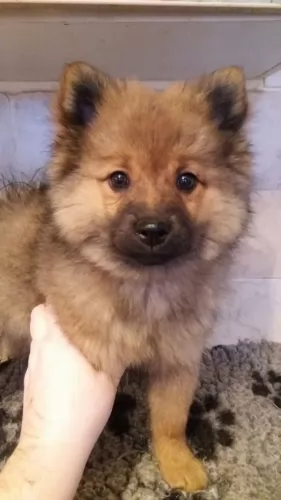 The German Spitz Mittel is similar in looks to the other sizes of German Spitz. The Mittel is a medium sized dog and stands between 30 and 38cm in height and weighs between 7 and 11kg. You’ll find him in solid colors such as tan, liver, white, fawn, black or a mix of these colors.
The German Spitz Mittel is similar in looks to the other sizes of German Spitz. The Mittel is a medium sized dog and stands between 30 and 38cm in height and weighs between 7 and 11kg. You’ll find him in solid colors such as tan, liver, white, fawn, black or a mix of these colors.
He has a soft woolly undercoat and a long outercoat with a mane-like ruff at the neck. He has a fairly long muzzle, dark eyes, sharp erect ears and a bushy tail which curls over his back.
Affectionate, faithful, and always happy by nature, the German Spitz Mittel is a family companion that wants to be part of everything his human family is up to. He makes a good watchdog. He is alert and has a distrust of strangers.
He gets on well with children in the home and he can also live in peace with other dogs. Because he is an intelligent dog, you won’t have much trouble with training- and socializing him, although he will require a firm, consistent owner and trainer.
Training and socialization are important as there are always some important commands such as sit, stay, come and lie down that you will want him to respond to immediately.
 You get the miniature and giant Schnauzer as well as the Standard. The Standard Schnauzer stands at between 43 to 51cm and weighs between 14 and 20kg. The dog comes in different color variants - black, black and silver and a greyish color.They have wiry coats that don’t shed much.
You get the miniature and giant Schnauzer as well as the Standard. The Standard Schnauzer stands at between 43 to 51cm and weighs between 14 and 20kg. The dog comes in different color variants - black, black and silver and a greyish color.They have wiry coats that don’t shed much.
They are squarely and robustly built and a typical feature is the mustache, beard and significant eyebrows of the dog. The ears are set high and were once clipped but they are left floppy these days.
The tail has always been traditionally cropped to around three vertebrae,giving the dog a distinctive look, but now it is often left as is and is medium length and curls over the dog’s back.
The Schnauzie is a seriously intelligent dog and this makes them highly trainable so that he can obey quite a few commands. These dogs get bored easily and will require exercise and games that will stimulate him mentally and physically.
They’re alert too, and will bark in warning at any intruders, making them excellent watchdogs. Other notable characteristics are courage and stamina and they have been used for search and rescue work.
These dogs have strong personalities, and are inclined to be stubborn so you want to be sure that they are trained and socialized. This makes them more amicable to be around – they’re obedient and know their place.
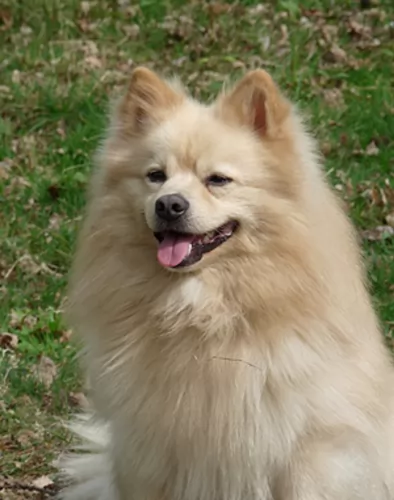 People who have owned a German Spitz Mittel are delighted with him, saying that he is such an easy-going, happy dog. He is social and thrives on the interaction he has with his human family.
People who have owned a German Spitz Mittel are delighted with him, saying that he is such an easy-going, happy dog. He is social and thrives on the interaction he has with his human family.
He won’t do well if you simply put him in your backyard and forget about him, using him merely as a watchdog.
The German Spitz Mittel dog is one dog that definitely lives up to the title of man’s best friend. He is social, happy, loving, loyal, playful, entertaining and smart too, and when you treat him the way he deserves, you’ve got the most awesome friend.
 Energetic, strong-willed and loyal, the Schnauzer can be an affectionate friend for children in the home as well as adults.
Energetic, strong-willed and loyal, the Schnauzer can be an affectionate friend for children in the home as well as adults.
He is cool towards strangers and he is also a bit snooty and aggressive with other dogs, but if he is brought up with them, he will show some loyalty and friendship towards them too.
 German Spitz dogs are healthy, and when you shower him with love and attention and good food, you can expect to have him around for up to 15 years of age.
German Spitz dogs are healthy, and when you shower him with love and attention and good food, you can expect to have him around for up to 15 years of age.
Of course, as with any other healthy dog breeds, there are always one or two common dog illnesses that your dog may get. These include hip dysplasia and eye diseases. If you notice symptoms that indicate possible joint issues with your pet, get him to the vet immediately.
Patellar Luxation for instance occurs when your dog’s kneecap is dislocated. It is more common in toy breeds like the German Spitz. It can be painful for your pet and lead to lameness. If your dog has problems with his hip, it can actually force the patella out of its groove, which is a secondary condition.
 Schnauzers are very healthy dogs. Nonetheless even these dogs can succumb to some of the many dog illnesses there are.
Schnauzers are very healthy dogs. Nonetheless even these dogs can succumb to some of the many dog illnesses there are.
Hip dysplasia is a common dog ailment and the Schnauzer isn’t immune to it. Hip dysplasia can be very sad in dogs as it can cripple a dog, with painful arthritis being his lot as well. It is no comfort for dog owners to know that hip dysplasia is common in most dog breeds – they are devastated when their once playful dog is brought down by hip dysplasia and exhibits signs of stiffness and pain.
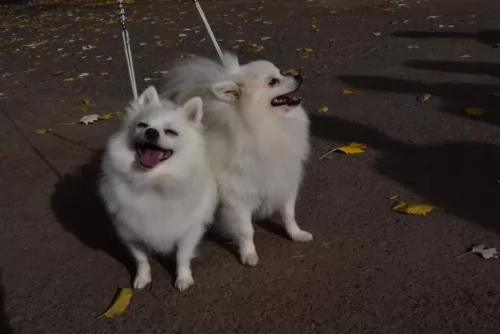 You can help reduce loose hairs with your German Spitz by brushing his thick coat twice a week. It’s a good time to also inspect your dog for ticks and fleas.
You can help reduce loose hairs with your German Spitz by brushing his thick coat twice a week. It’s a good time to also inspect your dog for ticks and fleas.
Your German Spitz Mittel isn’t the most active dog, but he will still need regular exercise. Going on a walk is good for both you and him. He is a mentally sharp dog too and these walks keep him both physically- and mentally fit. He also loves ball games.
Every dog deserves the best food, and if you feed your German Spitz Mittel with a commercially manufactured dog food, make sure its one of the top quality ones. You want to avoid foods packed with preservatives, colorants and fillers. You want dog foods with minerals and vitamins with high protein and ingredients such as Omega 3 and 6 to promote health skin.
There are also some dog foods which have ingredients in them such as polyphosphates. Ingredients like this keep your dog’s teeth clean.
Try and also give him some cooked rice, vegetables and chicken mixed into his kibble from time to time as well as raw meat. He should never be without fresh, cool water.
 Your Schnauzer will need to have his hair brushed twice a week as well as being professionally groomed. This is by hand-stripping or by clipping.
Your Schnauzer will need to have his hair brushed twice a week as well as being professionally groomed. This is by hand-stripping or by clipping.
Standard Schnauzers have lots of energy and will require adequate exercise every day – walks, ball games and runs off the leash.
Check his eyes and make sure there is no discharge. Check inside the ears and make sure there is no sign of redness and discharge. Look inside his mouth for rotting teeth. Bad teeth can cause lots of health problems with a dog, not just in terms of the teeth, but bad teeth can negatively affect other parts of the body too.
You want your Schnauzer to benefit from good food, after all nourishing food contributes to good health and longevity. If you choose to give your Schnauzer one of the commercially manufactured dog foods there are, make sure it is one of the better brands with more natural ingredients, The cheaper ones are filled with toxic ingredients.
Choose food according to his age, size and activity levels. To add some variety, feed him some home made food twice a week which can be added to his dry kibble. Boiled chicken, brown rice or pasta and spinach, sweet potatoes and carrots are a healthy choice for your pet. Try and include some raw meat into the diet. Ensure there is always a bowl of fresh, cool water for him.